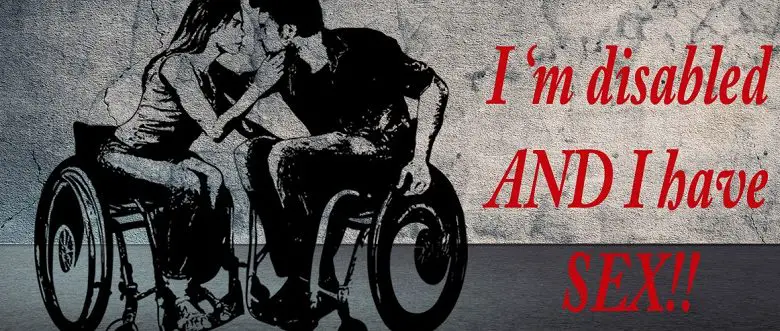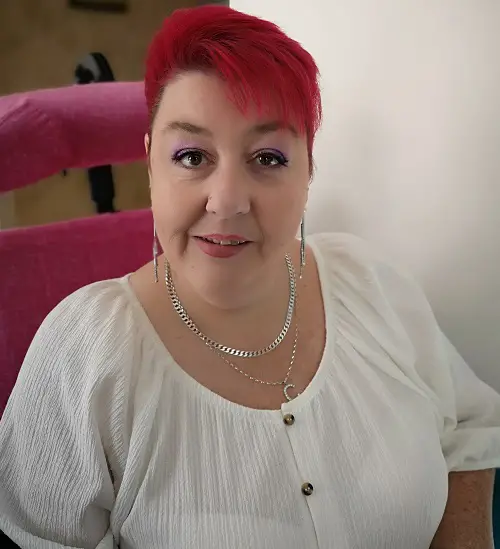
Why can’t disabled people have a sex life?
Wheelchair user Caroline believes that we are just as entitled as anyone else to have lots of fun, whether that’s travelling, shopping or even being pleasured in the bedroom. Yes, she’s tackling the taboo of disability and sex with her book Wheely Lots of Fun. Read on to find out more and tell us about your experiences.
My name is Caroline and I have arthrogryposis, which is not easy to say even when sober. I’m also 49, with two wonderful kids and an equally wonderful, supportive husband. I blog on disabled issues, fight for better disabled access to the high street and I also build websites.
Arthrogryposis multiplex congenita (AMC) is a rare condition, divided into three groups, namely amyoplasia, distal arthrogryposis, and syndromic arthrogryposis. Amyoplasia is characterised by severe joint contractures and muscle weakness. Distal arthrogryposis mainly involves the hands and feet. I suffer from both Amyoplasia and Distal Arthrogryposis.
I became a full-time wheelchair user roughly 15 years ago, due to scoliosis of my spine. I used to walk with leg braces (also known as calipers) and remember how difficult it was when I lost my independence, but that’s another story.
Having been disabled for some time now, I am passionate about fighting for disabled people’s rights to enjoy the same full life as anyone else. Why should we be any different?

Tackling the topic of sex and disability
I am in the process of writing a book called Wheely Lots of Fun’ about having a sex life as a wheelchair user. I feel that this is, in particular, an area where disabled people are not represented at all – there is little or no literature on the subject. Yes, there are medical journals and other ’professional’ opinions, but nothing on a personal level.
This is where I hope my book will make a difference. While I am trying my best to give correct and informed advice about having a sex life as a wheelchair user, my book is written very much on a personal level, as I use my own experiences to guide me.
Disabled people are asexualised in the media
The media seems to completely ignore the fact that disabled people have sex! How many disabled people do you see on TV, let alone in a romantic role? If we are portrayed in a film in a romantic role, we always seem to be portrayed as the victim.
The media contributes greatly to telling society what is perceived as ’normal’ – what we should look like, eat, wear and do? But whose ideal is this? Where did this originate? Who knows?
Health professionals should talk about sex
It’s not just the media either; the medical industry is probably the worse. Because my disability is so rare, doctors never discussed with me anything about having children, or even if my disability would be a factor. So here I was, four months pregnant (I didn’t know I was pregnant until then) with my first child and having to find someone who could give me some information.
Surely something of this magnitude should have been discussed with me? I can’t help but wonder whether this was because they didn’t believe I would ever want or have children. This would mean I’d had sex – surely not?
So I decided I wanted to publicise the fact that disabled people do have sex, enjoy sex and will always continue to do so.
Sex as a wheelchair user


Sex in a wheelchair is not an easy task, I can tell you! In my book, I share my findings about how, if you make a few changes and are somewhat creative, you can enjoy sex as a wheelchair user. When talking about my own experiences I highlight both the ups and downs (pardon the pun!) of life as a wheelchair user, as well as and how to have a fulfilling and satisfying sex life.
I also talk about relationships and how they are beneficial to your health, and I talk about the taboo surrounding disability and sex and how this can impact our lives.
Why is disability and sex a taboo?
So, what does ‘taboo’ mean? The dictionary’s definition is: “Proscribed by society as improper or unacceptable”. Based on this definition, disabled people having sex or any kind of sexual relations is deemed as improper and/or unacceptable. What a load of tosh!
Obviously, I can’t speak for every disabled person, but I’m sure I can speak for a lot of you when I say that we all ultimately want the same thing – a happy, safe, fulfilling and satisfying sexual relationship with our partner. How this is achieved, of course, varies from one couple to the next and I explore this in my book. Disabled people have the same issues as any able-bodied person wanting to have a sex life. We all have self-confidence concerns.
We all have physical barriers, although obviously wheelchair users have many more. Finding a partner? Well, let’s just say that my dating days were not a pretty sight.
Yet this taboo is made all the more difficult by the challenges of finding someone with whom to have open and informed discussions – especially when so many people believe that disabled people don’t or shouldn’t have sex.
Why sex is good for you
So it’s important that we break down this taboo. Why? Well did you know that sex is good for your health? According to some scientific studies, a loving relationship, physical touching and sex is good for reducing your blood pressure.
Sexual arousal sends the heart rate higher and the number of beats per minute reaches its peak during orgasm. Some studies show that the average peak heart rate at orgasm is the same as during light exercises, such as walking upstairs.
It’s also been shown that having heart disease doesn’t have to hold you back. Experts say that as long as you can do everyday tasks without any pain, you can have sex. Of course, I’m no GP, so if you have any concerns in any way, please speak with your GP first.
I think the media is just starting to wake up to the different types of people in the world and are starting to represent them better, including disabled people. Television, magazines and the like are showing more disabled people every day. Let’s hope it goes from strength to strength!
By Caroline
We want to help break the taboo of talking about sex and disability. Share your experiences of being held back or made to feel ashamed by commenting below or on Facebook and Twitter. Or, why not share your tips too 😉
More on Disability Horizons…

Thanks for sharing and challenging a taboo. Sex is a right for all, but I think many non-disabled need to know why sex is important for disabled individuals. I think many non-disabled would like to have a sexual relationship with someone disabled, but are often not sure about the needs of the other.
I totally agree and do talk about this in my book.
Such a rectified theory 🙂
This is something my wife and I talk about a lot. I have erectile dysfunction as the result of a stroke so the kind of sex life we used to have isn’t possible any more. So what did we do? Give up? No, we decided to think outside the box and look for ways in which we could maintain a sex life. And after five years, we now have a list of about 50 things which help us keep our sex life going and keep it entertaining and interesting. Like most things in life, it’s all about mindset – something which Caroline obviously understands!
Can you link to her book or social media? This doesn’t even have her last name and I’m struggling trying to find her :'(
Hi, I am Caroline, the writer of this book. Unfortunately, you can’t find my book as I am still in the process of writing it. I’m sure you can appreciate how sensitive this subject is and I want to make sure my book is informative as well as humorous.
You can visit my website: cazbarr.co.uk to find out more about me and my book. Thank you so much for your interest.
Hi I’ve been a right amputee since 1992 and have had mobility issues that has meant I can only walk short distances with an elbow crutch and that was 1 of my main concerns at 1st that I would lose my sex life but luckily when I was even still recovering I had no problems with continuing my sex life. But about 10 years ago all my hormones stopped working and they don’t know why but I was subsequently diagnosed with many other conditions and am constantly exhausted and sleep a lot and that’s my main disability I would say because this has even stopped me wanting sex for the last 10 years and I’m only 47! But now I would like to try to have a sex life back and hopefully even find a partner but I’m also gay and I feel that there is a lot more prejudice within the gay community to have the perfect muscled body! Also since July last year I am a permanent wheelchair user when outside and sometimes inside too but also about 2 years ago I developed bowel problems and in November last year I had to have an ileostomy operation and so now have a stoma and bag and I feel that this will put even more people off and I’ve no idea where to start on the dating scene because I’ve always met people out in pubs and I’m quite shy at 1st until I get to know someone and so I’ve really no idea where to start on the dating scene as I haven’t even been to a gay pub since I’ve been a wheelchair user as the ones I know all have steps up to them. Any advice appreciated.
I have find someone to date a man in a wheelchair first. Then if we want to date a 2nd, 3rd, 4th time. Then if we get to the point we want to be with each other that will be great. So far I have not met anyone. And this carona virus is not helping things.